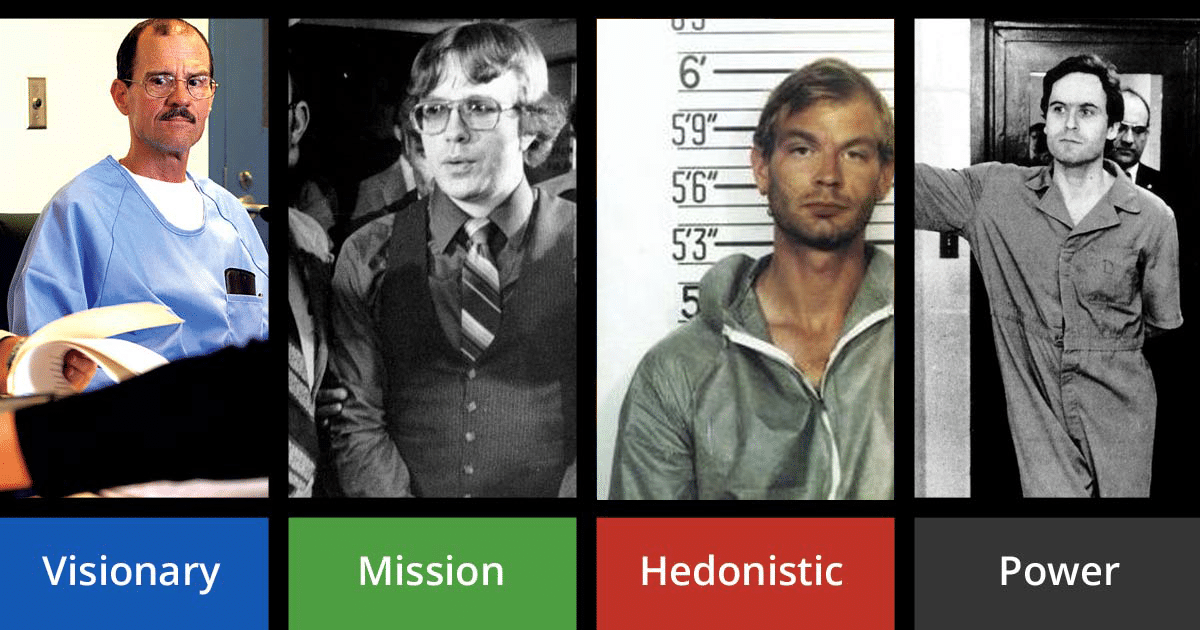
What is “Dexter’s” Serial Killer Typology?
'serial killer' (Lefebvre, 2005). Holmes and Holmes (2010) defined a serial killer as an individual killing three or more people, while Dyer (1997) emphasized the serial nature of the killings: 'Serial killers kill serially: one murder after another, each a variation and continuation of those before, each an episode in a serial' (p. Types of serial killers? Mission Oriented Mission Oriented serial killers murder because they are motivated to find revenge. Visionary These killers generally suffer from a form of psychosis where their delusions or hallucinations command them to murder. Power/Control These serial killers murder because they have the satisfaction they gain of.
Some of my students have recently asked me if I watch the Showtime series “Dexter”. While I did watch the first season out of curiosity I really haven’t watched it since. The reason, I tell them, is that Dexter really does not fit one of the generally-accepted serial killer typologies and the characters, overall, are just not that interesting to me.


This is when students tell me that they enjoy “Dexter” and have concluded that he is a “Mission” serial killer. While this is an interesting hypothesis, let’s examine whether or not “Dexter” is a match for a “Mission” serial killer.
We know that a “Mission” serial killer often kills people who represent a person or group of persons that have done him wrong in the past, or who he feels are worthless and, therefore, deserve to die. Hence, he is on a “mission” to eradicate these undesirables. My students, at this point, inform me that “Dexter” is, indeed, on a “mission” to eradicate certain, targeted bad guys. Using only the one criteria, they seem to have solved the puzzle. But, alas, there is more to this puzzle than just the why of killing people. There’s the “how”.

Examples Of Mission Oriented Serial Killers Examples
From what we have seen of Dexter’s pre-murder set-up (we never actually see the complete act), Dexter would obviously be classified as an “organized” offender. He is intelligent, methodical, socially-adept, and a good planner. Even that matches our “Mission” serial killer.
But, in examining Dexter’s set-up, there are some glaring inconsistencies. First, Dexter has his victims completely immobilized. This suggests a psychological need for power, domination, and control. Dexter’s satisfaction, in large part, is derived from his being totally in control of his victim’s destiny. His set-up also strongly suggests that he takes his time in killing his victims, which makes him a “process” murderer. As you know, the “Mission” serial killer is an “act-focused” offender who gets no real satisfaction from the act of murder, only from the result. Dexter, it would seem, obtains significant pleasure from the act of taking another person’s life. In fact, he gets so much pleasure that, in earlier episodes, we learn that his step-father, the cop, recognized this developing characteristic and re-directed it towards “bad guys” so that Dexter’s murderous behavior would have some form of social value.
So, if Dexter is not a “Mission” serial killer, what typology does he fit? The answer: None, really.
The closest I have come to a suitable typology is the “Thrill” serial killer but there are obvious problems with that. While it’s true that the “Thrill” serial killer has an Ideal Victim Type (IVT), it is a stretch to assume that “really nasty criminal” is an IVT. Another problem, as I’m sure you know, is that the “Thrill” serial killer, like most organized offenders who derive sexual pleasure from their killings, fantasize about their victims while they stalk them and plan for their demise. If Showtime really wanted to stress this characteristic, we would see scenes of Dexter, sitting alone, daydreaming about how he plans on killing his next victim, while masturbating to these images.
In the end, I’ve come to the conclusion that the only real serial killer typology that Dexter fits is the “Media-driven” serial killer. This is a serial killer who kills to satisfy the needs of the writer, the script, and the network. Judging by the number of movies and television shows about this typology, he, or she, is undoubtedly the most deadly typology of them all.
Power Control Killers
What do you think?